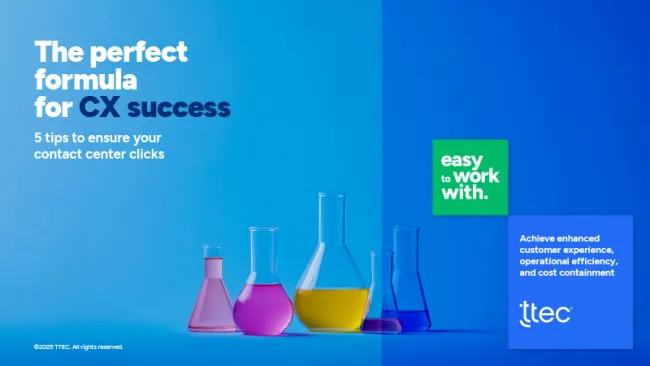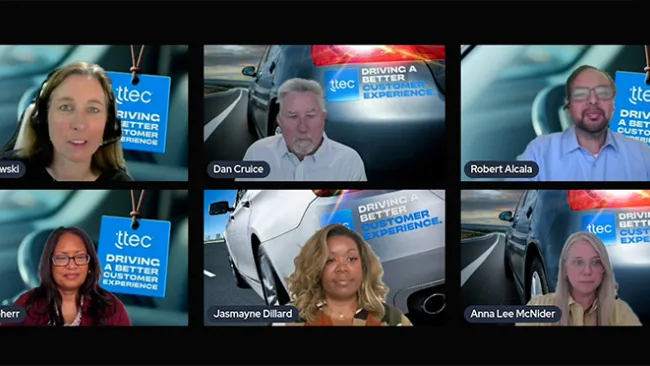Whether it's answering a simple question or tackling a technical problem, customer service representatives are at the front lines of meeting customer needs. Stephanie Finnell, a customer service representative at WebMD Health Services, sheds light on what it's like to work in a role that's quickly evolving in the era of the customer and the interactions that make her job rewarding.
Transcript: You're listening to the CX Pod by TTEC and the Customer Strategist Journal.
Judith Aquino: Hi, welcome to the CX Pod. I'm Judith Aquino. Today we'll be talking about what it takes to deliver a great customer experience. Joining me in this discussion is Stephanie Finnell, a customer service representative at WebMD health services. Welcome to the show, Stephanie.
Stephanie Finnell: Hi, I'm glad to be here. Thanks for having me on the show.
JA: Sure. So first, congratulations on being named a finalist to the ICMI Movers and Shakers List. I hope you win.
SF: Thank you. It was wonderful. Just the nomination was good, that's a winner for me.
JA: Great. And so, since you obviously know a thing or two about customer support, can you tell me how do you define a great customer experience?
SF: Okay, so for us at WebMD, excellent customer service experience means total customer satisfaction. We strive to answer all of our customers’ calls quickly. And our average speed is about 30 seconds or less. Our goal on every call or email is a first contact resolution if it's possible. We actively listen to their issues to ensure we understand how best to assist them. We make the customers feel comfortable by using our soft skills and we then answer their questions with confidence. If we're not able to answer their call on that first contact, then we set up research with our internal department and we stay in contact with our member until we get it resolved.
JA: What would you say is critical to be able to provide that kind of seamless support? Is it equal parts training and having the right technology?
SF: Yes. You're absolutely correct. And I think more of the training more so. And we do have ongoing training as things change or we run into issues with our clients that need to be addressed. So, we definitely keep an ongoing training to keep us abreast of new situations and things. And the technology, I have to admit, it does help too.
JA: Alright. And which channels are you supporting?
SF: For me personally, we use calls, voicemail, and email.
JA: How does that work when you realize that there might be a new issue or something to improve the customer experience? How does that get put into the system?
SF: Oh, okay. Well, it actually happens more often than you may think. Like right now we have some of our members are participating in challenges where they're, they can compete against each other with their steps. So sometimes if there is an issue with our system and it may cause a glitch and maybe some of their steps don't show up or they have problems. The members start reporting this to us and we research to resolve that. And so that's how we normally find out about issues sometimes. The corporation that we represent, they may bring something to our attention or they may want to make a change based on what they initially wanted us to do for them for their program.
JA: All right. And so, what do you find most challenging about being a customer service representative?
SF: So for me, the most difficult thing is pushing myself to be efficient, as efficient as I can while still being effective. I have difficulty putting quantity over quality. So sometimes I struggle with my handle time. Soft skills are one of the most important parts of customer service. And I feel like this is my, this is a strength for me. However sometimes this can lead to me seeming too helpful. And the customers always feel comfortable, comfortable with me. So that can kind of slow down my handle time too. Cause they, since they look, you know, liked me and they feel comfortable, they continue to ask question after question and it just kind of escalates that time on the phone with them. But I don't mind because I really enjoy speaking with their customers.
JA: That's great. And then so from the back end, does that mean, do you have to justify why your average handle time is longer than others? Or is that something that WebMD expects might happen?
SF: They do expect it, unlike some other companies I worked for where they would penalize you for that. And WebMD they're a really good company to work for. They take into account what we're doing for our customers. They listen to our calls and they can pretty much tell, at least for me or with me, that my handle time is longer because I'm, you know, helping the member as much as I can. I always look at it as if like what type of help would I want to get when I call a corporation for assistance, how would I want them to help me? What's the best approach and what do I need to do so that they just don't feel like a number and if I just want to get them off the phone because I have had that experience and I don't want our members to get that experience.
JA: Right. And how long have you been with WebMD?
SF: Oh my. Over four years. Actually it's five years, cause I'm going to get one of those little medals, so I'm excited about that.
JA: Has your role evolved since you started at WebMD?
SF: Oh boy. Yes. Really evolved since I've been here. So let me see. So I was hired in 2014 and at that time they initially hired me only to complete telephonic health assessments for end users and I was a part-time contractor. After three days they decided to make me a full-time contractor and then WebMD asked me to start taking inbound customer service calls. About three weeks after I started working for them, I still do the inbound calls, I still do the emails, all of this stuff. And then I was finally hired by WebMD permanently after nine months. The rest of that is history of course. And I just enjoy my job.
JA: Well, it definitely comes across that way and that's great. In terms of customer expectations, have you seen any changes? Are customers expecting responses even faster than just a couple of years ago? Or are they using more of a wider mix of channels to reach out?
SF: No. Their expectation as far as how fast we respond, that hasn't changed. And it may be because our turnaround time is like two days. So, if your response or anything is two days, you're pretty satisfied with that.
JA: What would you say is something that the average person wouldn't expect to happen at a context center?
SF: That's a good question. Let me think for a second. Oh, okay. This, this is something that I enjoy. A lot of…our clients has a lot of elderly members, some of them are like in their seventies up to their nineties. And so, although we were supposed to be just helping them with their accounts some of the people I can sense they're really calling because they want someone to talk to. We do tend to speak with them. And then we listen to some of their personal concerns that a lot of times don't even have anything to do with their health insurance, but it makes them happy and they have their verbal contact with another adult during the day. So that's a good thing.
JA: Wow, that's really interesting that in a way you're almost a therapist for some people.
SF: I feel like it sometimes. Yeah.
JA: Would you say that's also what's most rewarding about your job?
SF: Yeah, that was one of the things that's most rewarding cause I really enjoy talking to the retired people. They are so appreciative of assistance and say thank you more so than a lot of the young people. And I really enjoy that. That's one of the highlights of my job.
JA: Great. And so what advice do you have for other managers or companies on how to keep agents like yourself engaged and performing at high levels?
SF: Well, I guess they need to have supervisors like mine. There's very few corporations that I've worked for that I've had a supervisor that actually keeps track of me and what I'm doing. Not in a sense where she is interfering or meddling, but let's say it comes time for review or something. Somehow, she knows more about what I did than I did. So she'll have, she'll have all these pluses and wonderful things listed.
Wow. She noticed that. She always notices the things I do well. Of course, if there's some things I don't do so well, she notices that and it makes me feel like the company cares about me as an individual and I'm not just a body in a chair. You know, collecting a paycheck. So, they really do care about me and by them feeling that way about me, I also feel that way about our members. I want them to feel special like that as well. So, I think that goes a long way.
JA: When you say your supervisor notices the things you do, does that mean because she's listening to recordings of all of your customer interactions? Or is it from her being just really observant?
SF: Both. So, she does listen to some of my recordings. I'm trying to think of how she found out some of the other things. Cause I was really shocked when I saw the review. I'm like, you noticed that? She, yeah, so some recordings, some things she may hear from other employees. And it's just amazing. I, I haven't had a supervisor that observant before, so I almost want to ask her myself, how do you know all these things? I do.
JA: It really sounds like there are so many factors that have to fall in line to deliver a great customer experience.
SF: Right? We have a lot of teamwork going on too. So we try to reach our monthly objectives together as a team. And so, we're always kept abreast of what we're if we're meeting our goal and they don't wait until we fail or to the end of the month, like every week we get an update. So, it works a lot better like that. They always stay on top of if we're making our follow-up calls with our members, if we are doing research for them and also for people I need, but those long call times, like five minutes and it should be five minutes for the total [calls]. Sometimes it's my total with my notes and all that might go into seven. But they keep us abreast of all of that on a weekly basis and they also work with us to try to find out for us, Stephanie, what do you think would help you improve this area? Or they maybe listened to my calls. I say you might want to try this method or that method and it's pretty effective.
JA: Right. And can you give me a quick example of, was there a suggestion you made that helped improve the customer experience?
SF: Oh, that's a good question. Suggestion I made, well my, instead of like a suggestion, I like fight for the underdog. And I'll give you an example. Let's say for instance we did, we, you have a member [who] has completed something in the website. We have a website portal for each of our clients and it indicates things they’re supposed to do to complete well, if the information is not listed effectively on the website and the member says, well, it didn't say that. And I look to see what she's seeing and it really doesn't say that. Then instead of just going along with it and saying, well, “you are just not going to get those points,” I will go ahead and research and get in contact with the client program manager and say, “you know, what is it we can do to help this member?” Because they were in good faith following all the guidelines, doing everything that they were told, but they didn't meet it because the information just wasn't there. And so sometimes when I do that I'm honored with treating the person that credit that they deserve.
JA: Wow, so being a customer advocate. Well, thank you so much for telling me about what it's like at the front lines.
SF: Oh yeah, definitely.
To learn more about bringing humanity to business, come see us at TTEC.com or subscribe to our journal at CustomerStrategistjournal.com. Thanks. See you next time.














